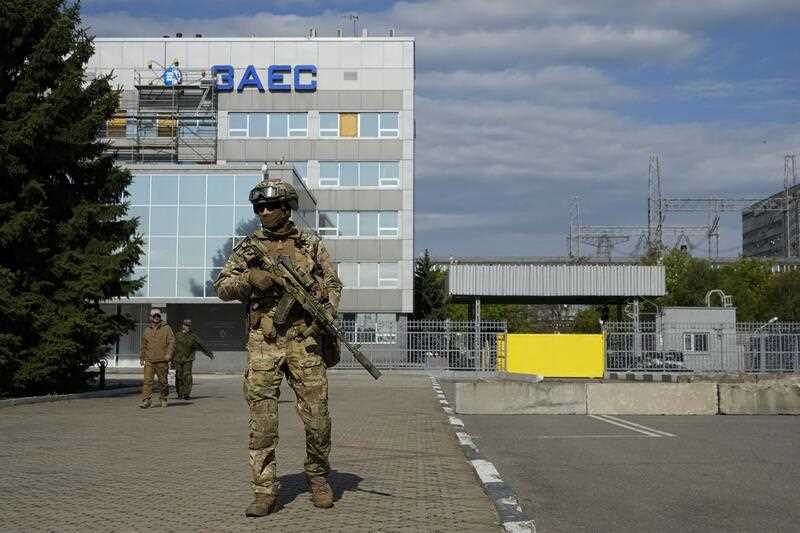Ukraine is targeting Russian soldiers who shoot at Europe’s largest nuclear power station or use it as a base to shoot from, as G7 nations, fearing a nuclear catastrophe, called on Moscow to withdraw its forces from the plant.
Ukraine and Russia have traded accusations over multiple incidents of shelling at the Zaporizhzhia facility in southern Ukraine. Russian troops captured the station early in the war.
“Every Russian soldier who either shoots at the plant, or shoots using the plant as cover, must understand that he becomes a special target for our intelligence agents, for our special services, for our army,” President Volodymyr Zelenskiy said in an evening address on Saturday.
Zelenskiy repeated claims that Russia was using the plant as nuclear blackmail.
The plant dominates the south bank of a vast reservoir on the Dnipro river. Ukrainian forces controlling the towns and cities on the opposite bank have come under intense bombardment from the Russian-held side.
Ukrainian presidential adviser Mykhailo Podolyak accused Russia of “hitting the part of the nuclear power plant where the energy that powers the south of Ukraine is generated”.
“The goal is to disconnect us from the (plant) and blame the Ukrainian army for this,” Podolyak wrote on Twitter.
The International Atomic Energy Agency, which is seeking to inspect the plant, has warned of a nuclear disaster unless fighting stops.
United Nations chief Antonio Guterres has called for a demilitarised zone around the Zaporizhzhia facility, which is still being run by Ukrainian technicians.
Kyiv has said it is planning a counteroffensive to recapture Zaporizhzhia and neighbouring Kherson provinces, the largest part of the territory Russia seized after its February 24 invasion and still in Russian hands.
Russian and Ukrainian forces earlier fought for control of Chornobyl, the still-radioactive site of the world’s worst nuclear accident, also raising fears of a disaster.
Russia’s priority in the past week had likely been to reorient units to strengthen its campaign in southern Ukraine, British military intelligence said on Sunday.
Russian-backed forces of the self-proclaimed Donetsk People’s Republic in the eastern region of Donbas continued assaults to the north of Donetsk city, the British Defence Ministry said in its daily intelligence bulletin on Twitter.
Particularly heavy fighting had focused on the village of Pisky, near the Donetsk airport, it said.
Two more ships carrying grain left Ukraine’s Black Sea ports on Saturday, Turkey’s defence ministry said, bringing to 16 the number of vessels to depart under a UN- and Turkey-brokered deal in late July aimed partly at easing a global food crisis.
Ukraine’s infrastructure ministry said on Saturday that 16 ships carrying 450,000 tonnes of agricultural products had departed from Ukrainian sea ports since early August under the deal, which ensured safe passage for vessels.
The UN-chartered ship MV Brave Commander would depart Ukraine for Africa in coming days after it finished loading more than 23,000 tonnes of wheat in the port of Pivdennyi, a UN official said.
The ship, bound for Ethiopia, will be the first humanitarian food aid cargo to Africa since the start of the war.
Ukraine hopes to soon increase its maritime exports to more than three million tonnes of grain and other farm products per month.
Ukraine and Russia are major grains exporters. The blockage of Ukrainian ports has trapped tens of millions of tonnes of grain in the country.
Russia’s invasion, which it calls a “special military operation” to demilitarise and “denazify” its smaller neighbour, has pushed Moscow-Washington relations to a low point, with Russia warning it may sever ties.
The United States has led Ukraine’s Western allies in supplying it with weapons to defend itself and punitive sanctions against Moscow.
Alexander Darchiev, head of the foreign ministry’s North American Department, was quoted as saying US influence on Ukraine had increased to the degree that “Americans are increasingly becoming more and more a direct party in the conflict”.
The United States and Europe, wary of being dragged directly into the war, have refused Ukraine’s request to establish a no-fly zone to help it protect its skies from Russian missiles and warplanes.
By Natalia Zinets in KYIV
Get the latest news, sport, entertainment, lifestyle, competitions and more delivered straight to your inbox with the Canberra Daily Daily Newsletter. Sign up here.



